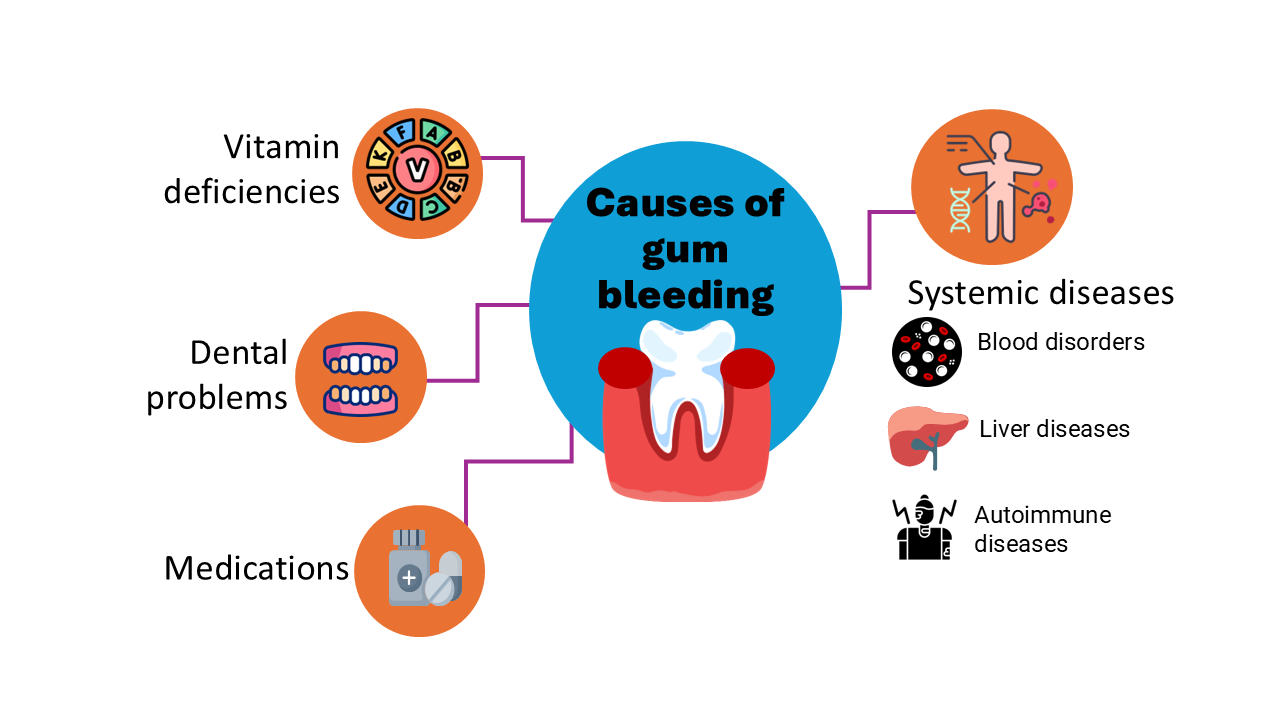
Causes of gum bleeding


1.Vitamin Deficiencies: Nutritional deficiencies, particularly in vitamin C and vitamin K, can weaken gum health and lead to bleeding. Vitamin C is essential for collagen production and gum repair, while vitamin K is crucial for blood clotting. A well- balanced diet rich in fruits, vegetables, and whole grains is key to maintaining healthy gums.
2.Medications: Certain medications, especially blood thinners (e.g., anticoagulants like warfarin or heparin), can increase the risk of bleeding. Additionally, some pain relievers, such as aspirin, can also affect blood clotting. If you're taking medications that could impact your gum health, it’s important to discuss them with your healthcare provider.
3.Systemic Conditions: Several health conditions, often overlooked, can lead to gum bleeding. Some notable conditions include:
i.Blood Disorders: Conditions such as thrombocytopenia (low platelet count), platelet disorders (e.g., Bernard-Soulier syndrome), and blood clotting disorders (e.g., hemophilia, von Willebrand disease) can cause easy bleeding, including from the gums. These conditions require thorough investigation and management by healthcare professionals. Additionally, blood cancers like leukemia can impact blood cell production, leading to symptoms like gum bleeding, easy bruising, or petechial rashes.
ii.Liver Disease: The liver produces clotting factors essential for proper blood coagulation. Any liver dysfunction can disrupt this process, leading to a bleeding tendency, where even minor injuries or irritations can cause significant bleeding.
iii.Autoimmune Diseases: Autoimmune disorders, where the immune system mistakenly attacks own healthy cells, can also affect gum health. Conditions like idiopathic thrombocytopenic purpura (ITP) and systemic lupus erythematosus (SLE) may cause bleeding gums along with other systemic symptoms, necessitating a comprehensive medical evaluation.
What Should You Do If Your Gums Are Bleeding?
If you notice persistent gum bleeding, consider taking the following steps:
1.Improve Your Oral Hygiene: Prioritize regular brushing and flossing. Use a soft-bristled toothbrush to avoid irritating the gums. You may also consider incorporating an antibacterial mouthwash to help reduce plaque buildup.
2.Consult a Dentist: Schedule an appointment with a dental professional to determine the cause of the bleeding. A dentist can assess your oral health, address any dental issues, and refer you to a medical specialist if systemic disorders are suspected.
3.Watch Your Diet: Adopt a well-balanced and nutritious diet. Make sure you're getting sufficient vitamins, especially vitamin C and vitamin K, which are essential for gum health. Incorporate foods like citrus fruits, leafy greens, and whole grains into your meals.
4.Review Your Medications: If you're taking blood thinners or other medications that could cause bleeding, discuss your treatment plan with your doctor. They may adjust your medications or suggest alternatives. Avoid purchasing over-the-counter medications without consulting your healthcare provider first.
5.Seek Medical Advice for Systemic Symptoms: If gum bleeding is accompanied by other symptoms, such as unusual bruising, fatigue, frequent infections, or unexplained weight loss, it’s important to see a healthcare provider. These could indicate a more serious underlying health issue that requires attention. Don’t hesitate to seek help - ignoring these signs could lead to more severe complications.
In summary, gum bleeding should never be ignored. By understanding its potential causes - ranging from simple oral issues to serious systemic disease - and knowing the steps to take, you can protect both your oral and overall health. If in doubt, always consult a healthcare professional. After all, it’s better to be safe than sorry!